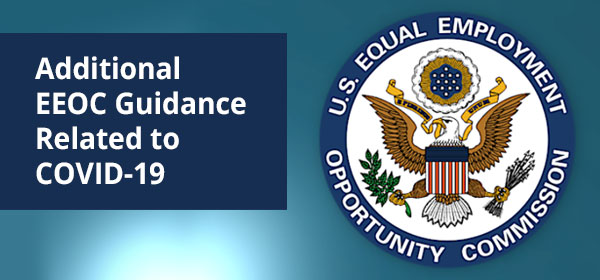
The EEOC has added to its guidance and technical assistance related to COVID-19. The guidance can be found here, but the new additions are summarized below.
Regarding reasonable accommodation:
- If an employee seeks accommodation because s/he is concerned about exposing a family member or member of the household, the employer is NOT required to accommodate. While accommodation can be voluntary, it is not mandated.
- Employers are not required to accommodate employees related to COVID-19 solely based on age. While the CDC has stated that people 65+ are at higher risk for severe illness if contracting COVID-19, that alone does not require accommodation. Employers may choose to be flexible with workers in this category and provide some accommodation voluntarily. This is true even if such accommodation results in workers younger than 65 being treated less favorably based on age in comparison to the 65+ workers.
Inviting employees to request flexibility in work arrangements:
- A general statement can be made to ALL employees that invite them to request flexibility or accommodation. The statement should note that all requests will be considered on a case-by-case basis. The statement should also direct the person or people who should receive the requests. Once a request has been made, it should be handled in a manner consistent with federal requirements.
- Flexible work arrangements made for employees with school-aged children are not discriminatory if male and female employees are treated the same. Employers should not make gender-based assumptions about who may have caretaking responsibilities for children.
Employee screening when coming to work:
- If the employee requests an alternative screening process when coming to work based on a medical condition, treat this as an ADA request for accommodation and use the interactive process to come up with an alternative to the screening process.
Treatment of pregnant employees during the COVID-19 pandemic:
- Pregnant employees cannot be required to work at home or be otherwise excluded from the workplace based on their pregnancy.
- Requests for accommodation by a pregnant employee should go through the standard ADA interactive process. Pregnant employees are entitled to job modifications that may include, among other things, telework and leave–to the extent that such leave would be provided for other employees who are similarly situated in their ability /inability to work.


